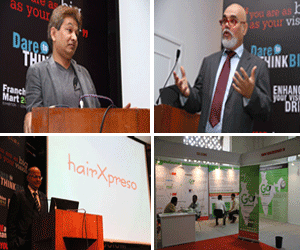The “nice guy” epithet definitely has benefits such as popularity in the workplace, people feeling they are a “good team-mate” that they can be depended upon. But, there is a fine line between being depended on and being dumped on….
Nice guys finish last” is a concept that goes beyond alcohol-induced, post-relationship break up rants. It applies to the workplace.
The implicit idea here being that if we are too nice or too kind, we will either be taken advantage of or taken for granted, whether it be our boss asking us to work over a holiday or our peers dumping their responsibilities onto us — either way it’s our loss….or is it?
Some of us who show up aggressive or assertive in the workplace have been called “pushy,” “selfish,” and have sometimes been accused of “not being a team player.” So who wins — the nice guy or the over-assertive pusher?
The answer is neither.
The “nice guy” epithet definitely has benefits such as popularity in the workplace, people feeling they are a “good team-mate” that they can be depended upon. But, there is a fine line between being depended on and being dumped on! The challenge with being the “nice guy” is that a lot of them run a pattern that I call the “disease to please” where focus on making everyone happy, on pleasing everyone. However, even though pleasing looks like it’s about others, there is a hook at the end of that pleasing — we please others so we ourselves feel validated or worthy or loved.
When we do not get the validation, recognition, acceptance or appreciation we are looking for, we can start to become resentful. At the bottom of every pleaser’s heart is the potential for a hard crust of resentment from sacrificing their happiness for the “good” of others.
Pleasers, they are making others happy, but in running the pattern they are only eroding their own happiness. Pleasers are unconsciously doing it to get something back. They are actually selfish, as selfish as the “pushers”, but their hook is disguised (even to themselves).
Besides not fulfilling their need for happiness, pleasing also makes them less effective business leaders because they can take forever to make an executive decision as they want everyone to be happy with it. This can be extremely detrimental to the success of a business because in a fast-paced, competitive environment any delay can lead to a loss of opportunity.
By waiting to make sure everyone was happy with the decision, they’ve lost their opportunity to grow and potentially their place in the market.
In addition, there is no guarantee that everyone will be happy. In the end it’s not about being popular; it is about making a decision and backing yourself.
One of the greatest innovators and business leaders in modern times, the late Steve Jobs, CEO, Co-founder and Chairman of Apple Inc., prided himself on positioning his businesses and their products at the forefront of the information technology industry by foreseeing and setting trends. At the end of his keynote speech at the Macworld Conference and Expo in January 2007, he articulated his philosophy by quoting Hall of Fame ice hockey player Wayne Gretzky:
“There’s an old Wayne Gretzky quote that I love. ‘I skate to where the puck is going to be, not where it has been.’ And we’ve always tried to do that at Apple. Since the very beginning. And we always will.”
If anticipation of where the market will go is one of the keys to growth in a business, the strategy of “pleasing” will always be a brake to accelerating innovation because the time you spend in trying to make sure everyone is happy with your idea will be time your competitors spend in developing the idea and executing it before you.
In addition, there is no guarantee that everyone will be happy.
In the end it is not about being popular, it’s about making a decision and backing yourself.
Like pleasers, being a “pusher” also has its perks — Pushers back themselves and are clear on what they want, the outcomes they want to achieve and they would not sacrifice them at the altar of making others happy. They value their own happiness, honor their own goals and have the drive, self-belief and conviction to make them happen.
But, again, like pleasing, pushing also has its downside. Over-aggression can either seem desperate or selfish in the eyes of others and the consequence could either be turning off their external clients or losing the support of their internal clients (their team). Being a pusher can yield short-term success at work, but the strategy won’t reap lasting results because even pushers, who make it to the top of the mountain, find that no one is there with them.
Billionaire and lifestyle guru, Martha Stewart, of net worth $650 million, was convicted of insider trading in 2001. Not one of her 600 employees reached out to her aid. Why? Because her focus was all about pushing her own agenda. Although her aggression did yield immense ‘short –term’ success, in the end, she was all alone when it really counted.
So what’s the solution?
Serve — serve the mission you believe in, serve your team, serve your organization.
Service does not come from a place of inferiority, it means being absolutely clear on the outcome you are committed to serve, but coming from a place of contribution rather than demanding significance (pusher) or craving significance (pleaser).
The intent is different. As a strategic consultant and coach to CEO’s of Fortune 500 companies and elite family businesses, I always tell my clients what they need to hear, not what they always want to hear because my mission is not to please them or push my theories onto them, it’s to serve their needs at the highest level, to customize a solution that adds massive value and supports them in achieving their outcomes.
This approach has always yielded the best results — whether it be for a multi-national or a family business. I have seen numerous examples of how a patriarch of a family business, in trying to please his family or sons, has caused even more uncertainty and created a lack of clarity in the organization and family. I have also seen how the new generation, in trying to push their way to succeed have disrupted the harmony and unity in the family and business. However, when both parties have focused on what ultimately will serve the family and the business, it’s always resulted in a win-win and the best decisions in the interest of the family and business.
No matter what business you are in, Pushers and Pleasers go to work to get, Servers go there to give. For example, your boss is seeking feedback after the failure of a new product launch. The Pleasers in the room will focus on what they think the boss wants to hear, the Pushers will focus on a solution that gives them what they want (whether it be recognition, added responsibility or opportunity to climb the corporate ladder), but the Servers will focus on what the customer actually needs.
If you want to truly succeed in the corporate world, step outside yourself and serve a need that is greater than your’s — your customer’s needs, your team’s need, your company’s need. Focus on adding value rather than being valued.
Out of the 50,000 people I have worked with, I have never met an employer who does not value someone who is continuously adding value. This strategy will be most effective in the corporate space because unlike pleasers, you will be giving from a place of abundance rather than from a void of self worth and unlike pushers, you will be able to empower others to support your goals because your fuel is based on “we” rather than “me.”
Strategic Peak Performance Coach and Consultant, Anand Chulani has worked with CEO’s of Fortune 500 companies and helped turn around elite businesses and family businesses in India as well as IPL and international championship winning sports teams.































 +91 9909960054
+91 9909960054